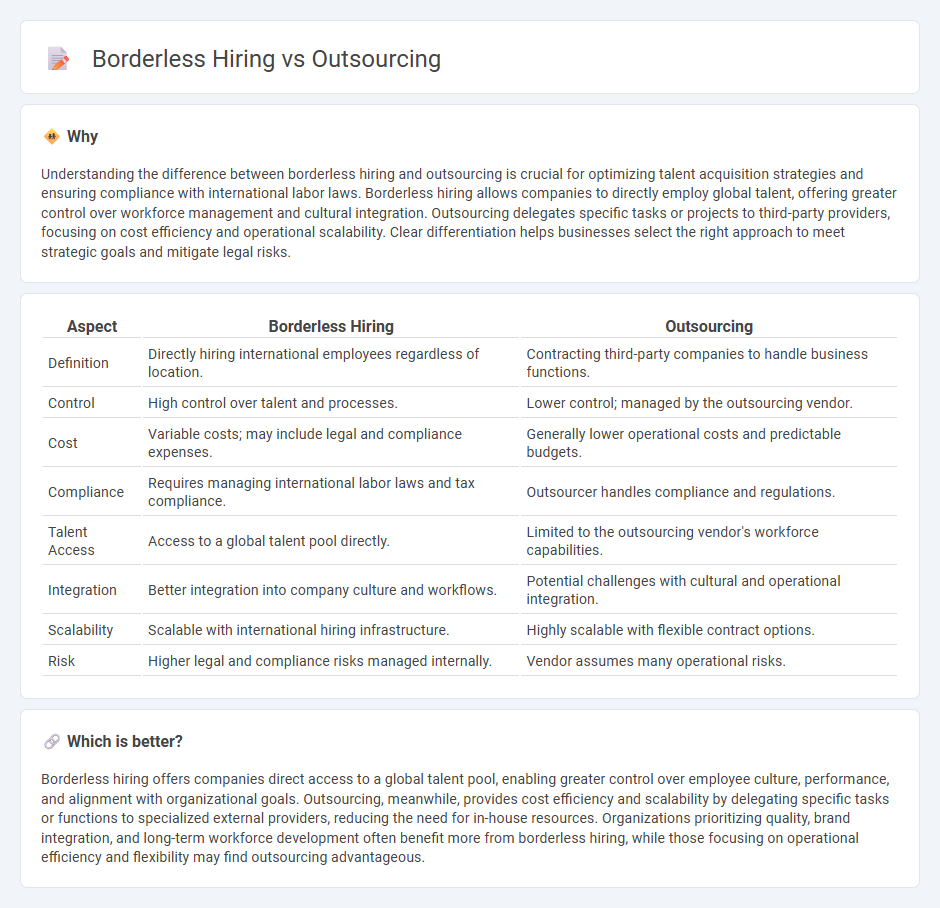
Borderless hiring enables companies to recruit talent globally without geographic limitations, streamlining workforce diversity and access to specialized skills. Outsourcing involves delegating specific business processes to external providers, often focusing on cost efficiency and operational expertise. Explore the distinctions between borderless hiring and outsourcing to optimize your human resources strategy.
Why it is important
Understanding the difference between borderless hiring and outsourcing is crucial for optimizing talent acquisition strategies and ensuring compliance with international labor laws. Borderless hiring allows companies to directly employ global talent, offering greater control over workforce management and cultural integration. Outsourcing delegates specific tasks or projects to third-party providers, focusing on cost efficiency and operational scalability. Clear differentiation helps businesses select the right approach to meet strategic goals and mitigate legal risks.
Comparison Table
| Aspect | Borderless Hiring | Outsourcing |
|---|---|---|
| Definition | Directly hiring international employees regardless of location. | Contracting third-party companies to handle business functions. |
| Control | High control over talent and processes. | Lower control; managed by the outsourcing vendor. |
| Cost | Variable costs; may include legal and compliance expenses. | Generally lower operational costs and predictable budgets. |
| Compliance | Requires managing international labor laws and tax compliance. | Outsourcer handles compliance and regulations. |
| Talent Access | Access to a global talent pool directly. | Limited to the outsourcing vendor's workforce capabilities. |
| Integration | Better integration into company culture and workflows. | Potential challenges with cultural and operational integration. |
| Scalability | Scalable with international hiring infrastructure. | Highly scalable with flexible contract options. |
| Risk | Higher legal and compliance risks managed internally. | Vendor assumes many operational risks. |
Which is better?
Borderless hiring offers companies direct access to a global talent pool, enabling greater control over employee culture, performance, and alignment with organizational goals. Outsourcing, meanwhile, provides cost efficiency and scalability by delegating specific tasks or functions to specialized external providers, reducing the need for in-house resources. Organizations prioritizing quality, brand integration, and long-term workforce development often benefit more from borderless hiring, while those focusing on operational efficiency and flexibility may find outsourcing advantageous.
Connection
Borderless hiring enables companies to access a global talent pool without geographical constraints, significantly enhancing outsourcing strategies by providing diverse skills and cost efficiencies. Integrating remote international employees through borderless hiring streamlines project management and reduces operational overhead typically associated with traditional outsourcing. This convergence of global recruitment and outsourcing fosters innovation, scalability, and competitive advantage in Human Resources management.
Key Terms
Global Talent Pool
Outsourcing leverages external vendors to handle specific business functions, while borderless hiring enables companies to directly employ global talent without geographical limitations. Accessing a global talent pool through borderless hiring enhances diversity, innovation, and agility by integrating top professionals from various regions. Explore how borderless hiring can transform your workforce strategy and unlock unparalleled access to worldwide expertise.
Cost Efficiency
Outsourcing often reduces operational costs by transferring specific tasks to external vendors with specialized expertise, enabling companies to avoid expenses related to recruitment, training, and infrastructure. Borderless hiring optimizes cost efficiency by allowing employers to recruit talent globally, leveraging salary arbitrage and diverse skill sets without the overhead of local employment regulations. Explore how integrating outsourcing and borderless hiring strategies can maximize your organization's cost savings and talent acquisition.
Legal Compliance
Outsourcing involves delegating business processes to third-party vendors, often requiring strict adherence to international labor laws, data protection regulations, and contractual compliance to mitigate legal risks. Borderless hiring enables companies to employ remote workers across multiple jurisdictions, demanding comprehensive understanding of local employment laws, tax obligations, and immigration policies to ensure full legal compliance. Explore our detailed guide to understand how legal frameworks impact outsourcing and borderless hiring strategies.
Source and External Links
What Is Outsourcing? (Including Types and Advantages) - Outsourcing is the practice where organizations hire outside contractors or companies to perform tasks or produce goods, usually to reduce costs and increase efficiency; it includes types such as onshore, offshore, nearshore, and onsite sourcing and applies to functions like customer support, accounting, and engineering.
What is Outsourcing and How Does it Work? - Outsourcing involves engaging third parties to perform tasks or services onsite or elsewhere, including IT, customer service, manufacturing, or entire departments, emphasizing managing business partnerships and clear contractual obligations.
What is Outsourcing? Definition, Advantages, and Examples - Outsourcing helps companies reduce costs, focus on core business activities, and gain specialist expertise by contracting third-party providers for non-core services like IT support or logistics, while also facing challenges like communication issues.
 dowidth.com
dowidth.com